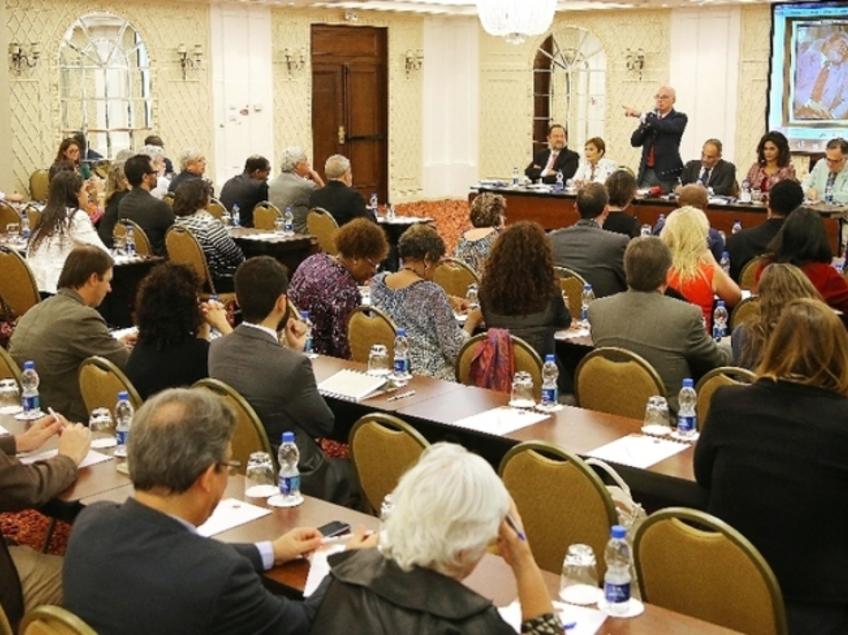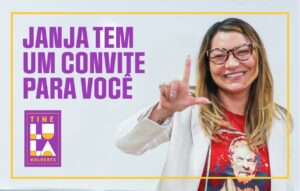In
São Paulo former President Lula officially opened theConselho
Africa on
April 23. This is a new space created by the Lula
Institute to gather some of its members and partners committed to improving
relations between Brazil and Africa, and concentrate their activities.
The
Council is the consequence of four years of work by the “Africa
Initiative”, one of the permanent projects of the Lula Institute, that
became qualified as a meeting point for dozens of people and institutions that are
working on projects directed towards Africa in a diverse number of areas.
Cooperation
in the areas of education, health and agriculture, intercultural exchange, activities
to promote democracy, peace and human rights and boost trade relations between
South America and Africa were subjects of hundreds of meetings and meetings
during this time, and numerous joint activities and formal partnerships were encouraged. The heavy agenda of talks on these
issues generatedthe
Conselho Africa. It is made up of historians, teachers, students,
representatives of social movements, former ministers of the Lula government,
journalists and representatives of NGOs and important multilateral
organizations.All of these people have links and
contact trajectories concerned with African affairs.
These
members of the Council make up a significant portion of the hundreds of friends
and associates who have been with us during these four years and now begin a
new chapter, to which many others committed to strengthening ties with Africa
will certainly be added.Today, there are forty members.To
skim through the list below, you can see that our friends and partners who live
abroad are not part of the Council, because of the difficulties in
participating in local activities.They have not been forgotten and are included
in a separate list so that they will be able get all the information about the
activities of the Council.
At
this time, we chose for not to invite the members who are serving in government
positions, because we wish to preserve for the Lula Institute the features of a
non-governmental organization. However, it should be noted that the activities of the
“Africa Initiative” have always had a close relationship with the
government of President Dilma Rousseff and the activities of various state and
local governments concerned with what happens with our neighbors across the
Atlantic.
And
when it comes to the Brazilian government, we owe a special deference to
Ambassador Paulo Cordeiro, Undersecretary for Africa and the Middle East in the
Ministry of Foreign Affairs of Brazil: the work of our “Africa
Initiative” would not have been possible without the establishment of the
necessary bridges with the Brazilian government, the African ambassadors in
Brazil and with authorities and representatives of civil society in many
African countries. We appreciate the untiring personal efforts, and the consistent
and caring support of our friend and partner Paulo Cordeiro. With his deep knowledge of the history,
culture and struggles of the peoples of Africa, Paulo will remain as a
permanent resource for our Board, and for that he has the gratitude of the
entire executive management of the Lula Institute.
I
would also emphasize many of the entrepreneurs and business people who in
recent years had the courage to brave the African continent are not part of the
Council.While one focus of our work is
collaboration with the enterprises that help with the social development of the
continent, and we have made a fair number of contacts and friends in this
period, we believe that it would be very difficult to select just one of them
to take a seat the Council.
OPERATIONS
The Conselho
Africa is planning to hold general meetings every quarter. Partners and friends as well as those
employees who live abroad and are passing through Brazil, who may be able to
contribute to the issues on the agenda may be invited as observers.
At
various times we will convene more restricted meetings limited to the directors
involved with a specific agenda of the institute or in the preparation of
seminars and thematic conferences throughout the year.We call our
series of discussions “Conversations on Africa” and expect them to be
intensified from now on. For example, here will be a meeting on May 26, for a
lecture by Ambassador Celso Amorim.
Our
main channel of communication, however, will be through the internet. A working group of the Council has been formed
using e-mail, and it will soon be available on Facebook for those who wish to use
it.These will be closed discussions, to be
used only by Council members to exchange information, ideas and challenges.But the
“Africa Initiative” will keep an open profile on Facebook for contact
between those, in Brazil and the rest of the world, that are interested in
things African.Our room here in the Lula Institute
site will also be expanded.This was one reason to include on our
Board several Africanist journalists.
It
is important to note that the Council begins its work with a significant number
of multilateral organizations and NGOs with operations in Africa represented, including
the Center of Excellence of the World Food Program (WFP), UNICEF, FAO, the Rio
+ Centre for Sustainable Development, the Bill & Melinda Gates Foundation,
the Articulação Sul and the BRICS Policy Center.
To all of them, our special thanks.
Other
representations of important institutions may be asked to join the Board, such
as “Doctors Without Borders”, which is carrying out an extraordinary
job in the poorest regions of the world and particularly in Africa.These
organizations are not represented at the moment due to statutory limitations,
but remain our indispensable partners.
PARTNERSHIPS
It
is important to note that the “Africa Initiative ” in addition to
the Council has formalized five accords, agreements and memoranda of
understanding with some of these organizations and other partners in Brazil and
Africa.
The
most important of these was the partnership agreement that former President
Lula signed in June 2013 with the continent’s leading integration institutions:
the African Union based in Addis Ababa, the capital of Ethiopia, and its
development agency, NEPAD, in Johannesburg, the capital of South Africa. Also
represented in this same agreement is the FAO, the United Nations Food and
Agriculture Organization, based in Rome and led by Brazilian Jose Graziano da
Silva.
The
goal of this partnership is to develop actions to contribute to the eradication
of hunger on the continent by the year 2025. A committee of the four partners, will
carry out the decisions of the Agreement through an Action Plan for each of
these African countries: Ethiopia , Malawi, Angola, Niger and Senegal.Social
protection programs in Brazil are an important reference for Africans in facing
this challenge.
The
Institute also entered into an important cooperation agreement with the Center for
Excellence of the World Food Program, WFP, led in Brazil by current adviser
Daniel Balaban. In addition, the Lula Institute has
established formal partnerships with the Angolan Eduardo dos Santos Foundation; the International Center for the Promotion of
Human Rights, from Argentina, and the Brazil – Africa Institute, in Fortaleza
Ceará. This agreement is also part of NEPAD, from
the African Union.
At
the moment we are close to signing four other important agreements with UNICEF,
UNDP, the Bill & Melinda Gates Foundation and the BRICS Policy Center with
links to PUC / RJ. All progress will be reported through the Lula
Institute site.
Another
highlight in the list of counselors is the number of social movements represented.Those
who have developed projects directed towards Africa and worked with us over the
last four years were invited. A good example is CONEN – The National Coordination of Black
Organizations, the Movement of Small Farmers – linked to the MST and the Via
Campesina, the bank employees and metalworkers trade unions in Sao Paulo and the
ABC, the Foundation for Social and Educational Assistance Agencies, the Olodum
Grupo Cultural and the Quilombolas.
Finally,
it is essential to record our pride at having the support of a group of
historians and teachers that brings together some of the most important
Brazilian scholars specializing in African studies and other young Africanists.It
was they who gave substance and content to almost everything we have said and
done in this period.On the Conselho Africaare professorsAlberto da Costa e Silva, Beluce Bellucci, Fernando
Mourao de Albuquerque, João Bosco Monte, Kabengele Munanga, Ladislau Dowbor,
Luiz Felipe de Alencastro, Paulo Esteves and Suhayla Kalil. It is not only an honor to have these distinguished
individuals serving with us, but it is also an assurance that the theoretical
basis of our future activities will be guaranteed.
We
are witnessing the start of an enormous undertaking with huge prospects.We
wish to register here our thanks to all the directors who were willing to
devote their energy, knowledge and time to this challenge.In
particular, we wish to express our appreciation to former Lula government
ministers Celso Amorim, Samuel Pinheiro Guimarães, Franklin Martins, Miguel
Jorge, Matilde Ribeiro and Marcia Lopes, some of the main formulators and
executors of the Africa agenda from 2002 to 2010 and who keep their feet firmly
on the continent today.
Celso Marcondes
Director for Africa IL
CONSELHO ÁFRICA
Alberto da Costa e Silva(Historian, member of the Brazilian Academy of Letters)
Alexandra Loras(Journalist,
social activist, Consul of France in São Paulo)
Ana
Fonseca(Researcher at Unicamp Center for
Public Policy Studies)
Beluce
Bellucci(Professor of the Center for Afro-Asian
Studies, University Cândido Mendes)
Bianca
Suyama(International Relations, executive
coordinator of the Center and the Joint South-South Cooperation)
Celso
Amorim(Ambassador, former Minister Minister
of Foreign Affairs and Defense)
Clara
Ant(Architect, the Lula Institute
director)
Daniel
Calazans_(Metallurgist, director of the ABC
Metalworkers’ Union)
Daniel
Balaban(Economist, director and representative
in Brazil’s Center for Excellence Against Hunger of the World Food Program –
WFP)
Fátima
Mello(Historian,
coordinator of FASE – Solidarity and Education)
Fernando
Mouraode Albuquerque (Professor at USP and the Independent
University of Angola)
Flávia
Antunes(International Relations, Global Health
Strategies Manager of the Bill & Melinda Gates Foundation)
Flávio
Carrança(Journalist, director of the
Journalists Union of São Paulo)
Franklin
Martins(Journalist, former Minister of the
Secretariat of Social Communication)
Kabengele
Munanga(Professor of anthropology, FFLCH –
USP)
Gary
Stahl(International Relations, UNICEF Representative
in Brazil)
Gilberto
Afonso Schneider(Agriculture and Livestock Technician,
Director of the Movement of Small Farmers – MPA)
Gilberto
Leal(educator, director of Black Organizations
National Coordination – CONEN)
Helena
Tavares(Graduate student in International
Relations at Columbia University, USA)
Iole
Iliad(Geographer, vice president of the
Fundação Perseu Abramo)
Ivone
Maria da Silva(Banking, Secretary General of the Bank
Workers Union of São Paulo)
João
Bosco Monte(Professor, University of Fortaleza,
president of the Instituto Brasil-África)
João
Cesar Belisário(Journalist, representative in Brazil
of the Angolan Africa 21magazine)
João
Jorge Rodrigues(Attorney, president of the Grupo
Cultural Olodum)
José
Vicente(Attorney, professor and dean of the
Universidade Zumbi dos Palmares)
Ladislau
Dowbor(Professor of Economics and
Administration, PUC – SP – Graduate School)
Luiz
Felipe de Alencastro(Historian, professor at the Getulio
Vargas Foundation)
Márcia
Lopes(Social Worker, FAO consultant, former
Minister of Social Development and Fight against Hunger)
Marcos
Lopes(International Relations, consultant
FAO Humanitarian Cooperation)
Matilde
Ribeiro(Professor at Unilab, former minister
of Racial Integration)
Maya
Takagi(Engineer, Secretary of International
Relations at EMBRAPA)
Miguel
Jorge(Journalist, former Minister of
Development, Industry and Foreign Trade)
Monica
Valente (Psychologist, Secretary of International Relations, PT
Natália
da Luz(UN Public Communications Assistant,
journalist at the Inside Africa Site)
Paulo
Esteves(Professor at PUC-RJ and general
supervisor of the BRICS Policy Center)
Rômulo
Paes, MD(Director of the Rio + Centre for
Sustainable Development)
Salem
Nasser(Professor and coordinator of the
Global Law Center at the Law School of the Getulio Vargas Foundation)
Samuel
Pinheiro Guimarães(Ambassador, former general secretary
of the Foreign Ministry, Instituto Rio Branco)
Suhayla
Khalil(Professor at the School of Sociology
and Politics of São Paulo – ESPSP)
Tamires
Gomes Sampaio(Student, president of the Academic
Board of the Law School of Mackenzie University and member of the CONEN Youth)




